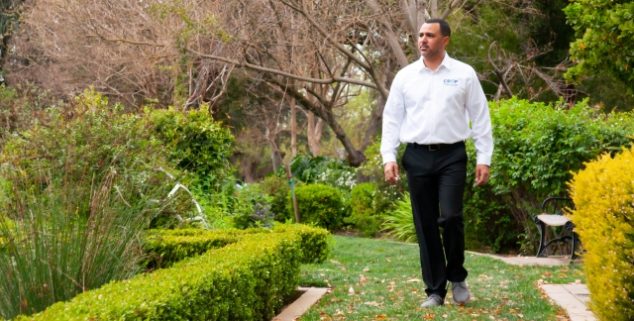News
The struggle to help inmates get back into society
 Former state prison inmate Jason Bryant has co-founded a group to help inmates re-enter society. (Photo: Tammy McCarley)
Former state prison inmate Jason Bryant has co-founded a group to help inmates re-enter society. (Photo: Tammy McCarley)Ted Gray and Jason Bryant committed violent felonies when they were 22 and 20 years old, respectively. Consequently, the young duo received lengthy prison sentences. That was then.
Today, they are older and wiser and cofounders of Creating Restorative Opportunities and Programs (CROP). It aims to help formerly incarcerated people striving to be productive members of society.
Dubbed Ready for Life, CROP’s three-year pilot program received $28.5 million from the 2021-22 state budget’s General Fund for three years. The allocation for CROP to operate came out of a Senate Budget Committee proposal.
Incarcerating one adult in California costs $120,000 per year.
State Assemblymember Wendy Carillo (D-LA), Chair of the Budget Subcommittee, and state Senate Budget Chair Senator Nancy Skinner (D-Berkeley) were key to securing the funding.
“This program is monumental by focusing on rehabilitation and investing in individuals to restart their lives, reunite with their families and succeed in our communities,” Assemblymember Carrillo said in a statement. “CROP, led by system-impacted people, is well poised to help us ensure that those returning home can successfully restart their lives after incarceration,” Sen. Skinner added.
From a fiscal viewpoint, CROP’s $28.5 million funding from the $210 billion 2021-22 General Fund saves money for state taxpayers. Consider this: Incarcerating one adult in California costs $120,000 per year, Bryant, CROP’s program director, told Capitol Weekly. By contrast, CROP’s price tag is half that six-figure amount per person, according to him. The math of the state spending contrast speaks volumes.
Two places for participants to land are internships and full-time employment. The rubber meets the road here.
How does CROP work with those exiting the state prison system? “We have a four-pillar approach to reentry for formerly incarcerated people,” Bryant told Capitol Weekly. The pillars are mindset, skillset, employment, and housing, he said.
The mindset curriculum for the formerly incarcerated focuses on improving their emotional intelligence, willingness to learn, problem solving and communicating. Prisoners lead lives of regimentation. When they eat and exercise, for example, are decisions they do not make. This is no way to enhance their mindset skills for successful reentry.
In CROP’s pillar two, the formerly incarcerated acquire labor force skills. They include knowledge and technology-based career development training. In this way, the participants improve their chances to obtain stable jobs in the labor force that pays them a family-supporting wage.
The third pillar of employment drills down on CROP’s advocacy for formerly incarcerated people to be new hires. Two places for participants to land are internships and full-time employment. The rubber meets the road here.
The fourth and final pillar is housing. Formerly incarcerated people are at-risk of homelessness and unstable shelter by orders of magnitude versus the general population. To reverse this trend, CROP aims to create and sustain housing providers to assist the formerly incarcerated to get stable housing after program graduation.
They began to improve the lives of other prisoners, in part by purchasing band and sports equipment and teaching leadership classes.
The genesis of CROP is the California state prison system that houses adults separated along the color line. Bryant and Gray, one black and the other white, spent seven years in Susanville’s High Desert State Prison.
“While incarcerated there,” Bryant said, “Ted and I did see each other, but the divisive racial politics forced us to treat each other like strangers or suffer the consequence of violence perpetrated against us.” Eventually, Bryant and Gray ended up at Soledad State Prison in Salinas.
There, the men, with family support on the outside, including Ted’s father Mitch, began to improve the lives of other prisoners, in part by purchasing band and sports equipment and teaching leadership classes. Bryant and Gray did not stop there.
With help from other incarcerated leaders such as Richard Mireles, CROP’s communications director, and Matthew Braden, CROP’s business operations director, Bryant and Gray also spearheaded fundraising of $32,000 from multiple small donors of Soledad prisoners to cover the tuition of a Salinas Catholic high school student, Sy Newson Green, experiencing financial hardship in 2016, as The Washington Post reported.
Much has changed for CROP, Bryant and Gray, since 2016. Case in point is that Gov. Gavin Newsom granted them clemency in 2020.
This July, CROP will begin to renovate a building in Oakland, where the organization operates. There will be 50 formerly incarcerated people living there and another 20 housed elsewhere, all of whom will get training in CROP’s four pillars that support successful reentry to society.
In addition, a CROP housing and training building for the formerly incarcerated is on tap in Los Angeles. There, CROP will collaborate with the Los Angeles Trade Technical College. The LA site will serve 60 participants, according to Bryant, using the organization’s four-pillar approach to reentry.
CROP is a 501(c) 3 tax-exempt nonprofit organization. Further, it is seeking financial donors and partners to continue operating after three years of state funding expires. To contact CROP, click here.
—
Ed’s Note: Seth Sandronsky reports regularly for Capitol Weekly. Contact him at [email protected]
Want to see more stories like this? Sign up for The Roundup, the free daily newsletter about California politics from the editors of Capitol Weekly. Stay up to date on the news you need to know.
Sign up below, then look for a confirmation email in your inbox.

Leave a Reply